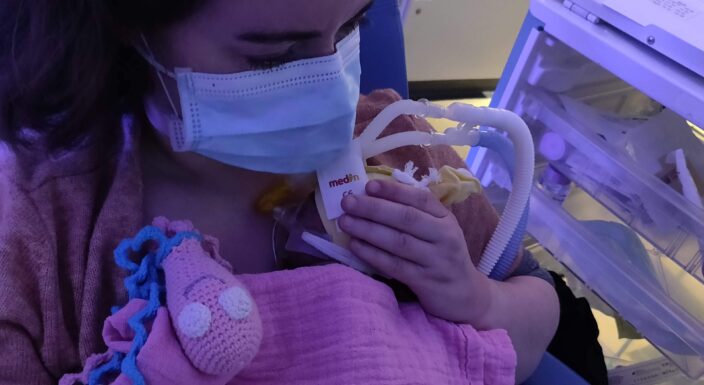
NNUH joins study to protect preterm newborns from hospital-acquired infections
NNUH has joined the Europe-wide NeoDeco trial, investigating if skin-to-skin contact reduces infection rates in NICUs.
Hospital-acquired infections pose a serious risk for newborns, especially premature babies. The NeoDeco study, sponsored by Fondazione Penta ETS, is investigating the effectiveness of kangaroo care as an innovative method to prevent infections in neonatal intensive care units (NICUs).
The study will involve up to 24 NICUs in Italy, Greece, Spain, Switzerland and the UK, including NNUH, in a joint effort to improve neonatal health.
Prof Paul Clarke, Consultant Neonatologist and local Principal Investigator for the study, said: “For many years we have encouraged parents to carry out kangaroo care in our NICU because we know the benefits it brings, such as better bonding, attachment and growth, and increasing the confidence of parents in caring for their babies.
“There is now a large body of evidence that shows that babies, especially premature babies, are more stable and have better outcomes with this early direct skin-to-skin contact with their parents. We’re delighted to be taking part in this study to see if optimised kangaroo care can also reduce the risk of infections in babies. We are looking to recruit around 120 babies onto the study. If it shows that optimising the duration and quality of kangaroo care reduces the risk of infection, this will potentially help many thousands of other babies treated on NICUs around the world.”
Every year, around 400,000 babies in Europe are born preterm and require admission to a NICU. While neonatal intensive care greatly improves their chances of survival, it also exposes these vulnerable babies to antibiotic-resistant bacteria from the hospital environment. These bacteria can lead to severe infections, sepsis and even outbreaks of disease, posing significant risks in the fragile NICU environment.
For premature newborns, the World Health Organization recommends kangaroo care, a simple, safe and low-cost practice that involves prolonged skin-to-skin contact between the baby and their caregiver. Kangaroo care is thought to help babies acquire more healthy bacteria, which can boost the development of their immune systems.
Despite its benefits, the broader impact of kangaroo care on preventing transmission of antibiotic-resistant bacteria and reducing NICU infections is still underexplored.
“NeoDeco’s objectives extend beyond examining kangaroo care’s impact on individual babies. Our focus is to evaluate its potential as an infection prevention and control measure, when applied to most babies in an optimal and sustainable manner by NICUs,” said Julia Bielicki, Prof in Paediatric Infectious Diseases at City St George’s, University of London and NeoDeco Chief Investigator.
Carlo Giaquinto, Prof of Paediatrics at the University of Padua in Italy, and President of Fondazione Penta ETS said: “If successful, NeoDeco will not only contribute to validate the health benefits of kangaroo care but could also establish a new standard of care to improve preterm birth outcomes across Europe, ensuring a healthier start for this vulnerable population.”
NeoDeco launched in June 2024 with an initial group of ten NICUs from Greece and Switzerland. Eleven neonatal units from Greece, Italy, Spain and the United Kingdom have joined the study between February and March 2025, with additional units expected to join soon. This could bring the total to 24 sites across five European countries. Results from the study will be available at the end of 2026.


